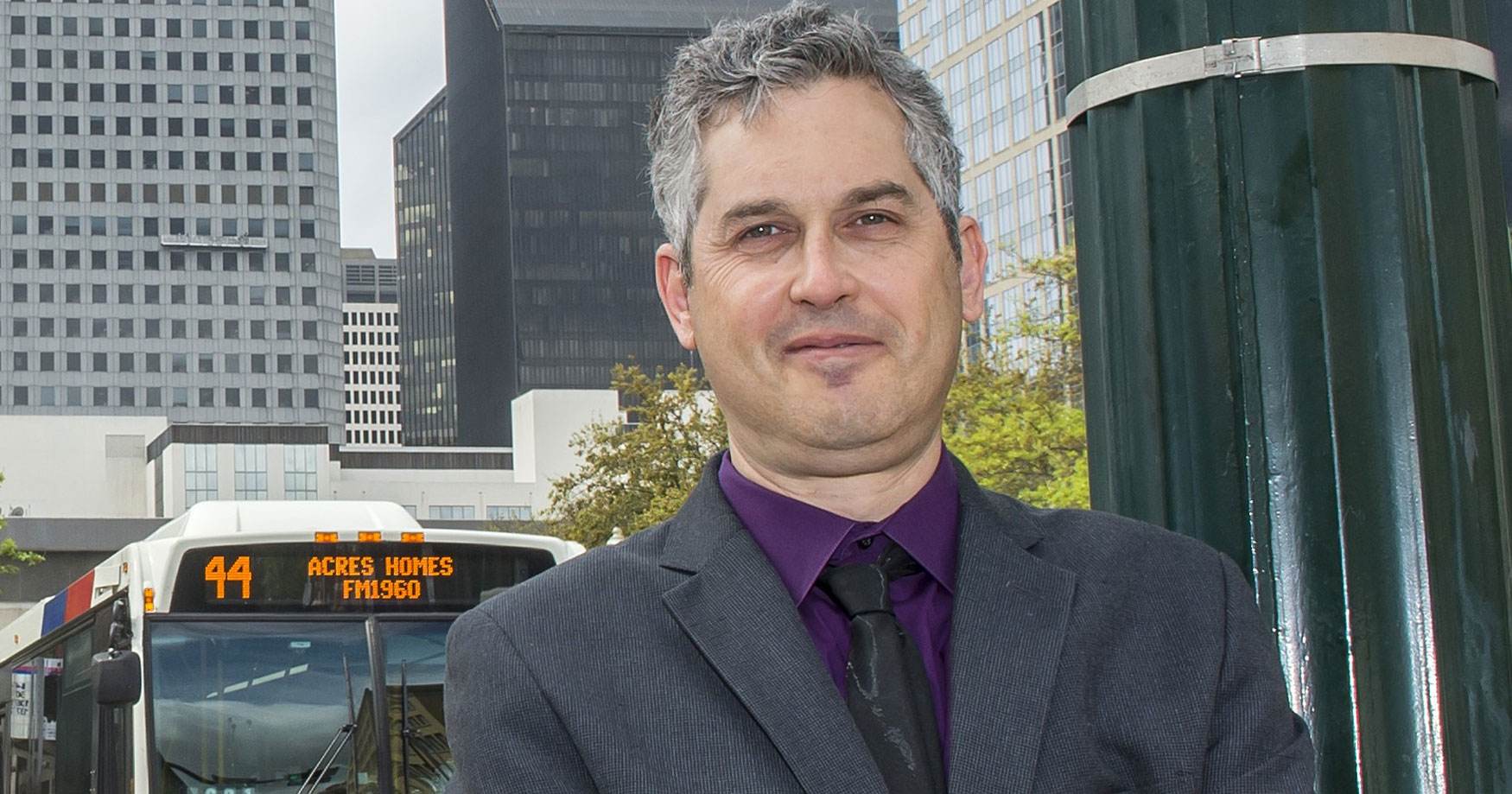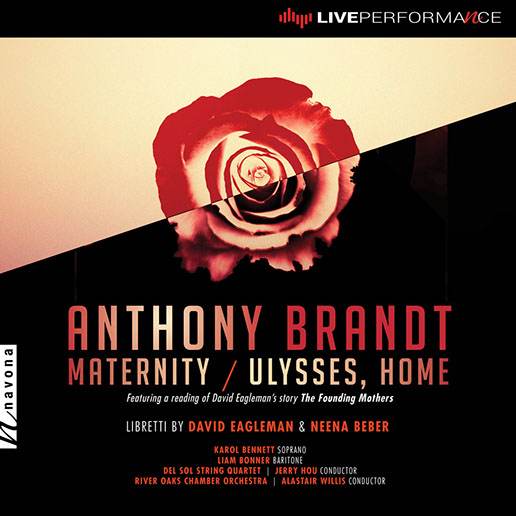
Multi-award-winning composer Anthony Brandt brings us MATERNITY / ULYSSES, HOME, which includes two very distinct compositions with libretti.
Brandt earned his degrees from Harvard University and the California Institute of the Arts, and his catalog includes three chamber operas as well as orchestral, chamber, vocal, theater, dance, and television scores, and sound-and-art installations.
Maternity for soprano and chamber orchestra is based on neuroscientist David Eagleman’s short story “The Founding Mothers.” Eagleman (co-author with Brandt of the book that inspired the Netflix documentary The Creative Brain) reads the complete story on the album. The work traces a maternal line back through millions of years of history, as Brandt brings listeners from today’s children down the evolutionary chain to early humans, primates, aquatic creatures, and eventually a single cell.
Ulysses, Home imagines Homer’s story of Ulysses and his return to Penelope in a contemporary context, portraying the hero as a modern soldier suffering from post-traumatic stress disorder. Scored for soprano, baritone, and string quartet, and comprised of five continuous scenes, the opera’s opening evokes the ferocity of combat and Ulysses’s many tours of duty.
When did you realize that you wanted to be an artist?
I think for all of us the goal is to find something you can spend 6-8 hours doing and it feels like no time has passed. For me, that definitely wasn’t playing the violin: even one hour of practicing felt like an eternity. My music used to be pock-marked with holes where I would strike it with the bow in frustration, and I’d often hide in the bathroom to make the time pass more quickly. Meanwhile, I could spend an entire day composing and feel like I could still keep going.
The other thing I’ll say is that I don’t believe nature gives us the desire to do something that we’re not capable of. It may not come easily, and there’s no guarantee of success. But I believe the wish to do something is often an indicator of the ability to do so. I started to wish to be a composer as a young teen, but it took a long time for me to develop.
What is your guilty pleasure?
I’m vegetarian, but can’t live happily without Chinese hot and sour soup. It’s my go-to treat whenever there is something to celebrate.
If you could make a living at any job in the world, what would that job be?
I might balance my time a little differently, but I’m very grateful to be doing exactly what I’m doing now: composing, teaching, and doing research into creativity and music cognition. My main lament about composing—and one of the biggest obstacles to making a living at it–is that, too often, a great deal of time, effort, and expense is involved in premiering a work once, in one venue. Visual art can be owned, but music is meant to be shared. I hope that consortium commissions become the rule in the future: a piece should ideally start its life in multiple places. This is also why recordings are so important: they are the best platform for getting one’s creative work out into the world.
If you could spend creative time anywhere in the world, where would it be and why?
The MacDowell Colony. I was fortunate to spend summer months there twenty years ago, and long to go again now that our children are grown. To have undivided time among a community of artists from all disciplines in a supremely beautiful natural setting is unbeatable.
What does this album mean to you personally?
As a composer, I’ve always felt that I can live with whatever reaction the audience has so long as the music is well played; it’s only when the performance is faulty that it is hard to face the public. The fact that both recordings on this album are unedited live performances is a testament to the exceptional level of the musicians. These kinds of readings—especially at world premieres—are the greatest gift a composer can get.
The album also features some of the people who are closest to my heart: my wife Karol Bennett; my friend and collaborator, the neuroscientist David Eagleman, with whom I wrote the book “The Runaway Species”; and playwright Neena Beber, with whom I’ve just collaborated on a second chamber opera. I also loved working with baritone Liam Bonner, conductors Jerry Hou and Alastair Willis, the Del Sol String Quartet, and the River Oaks Chamber Orchestra. All are amazing artists. The album is a celebration of these very meaningful partnerships.
Is there a specific feeling that you would like communicated to audiences in this work?
My oratorio Maternity is based on David Eagleman’s story, “The Founding Mothers,” which traces a maternal line back through history, all the way to the birth of gender. David’s libretto makes one realize that the improbable chain of circumstances, near-misses, and twists of fate are responsible for any of us being alive. David’s story makes me feel awe, amazement, and gratitude that we were all ever born, and I hope the music conveys that.
In writing the libretto for “Ulysses, Home,” playwright Neena Beber drew on her experiences as a writing counselor for veterans and their spouses. Neena’s libretto captures in a compassionate and poetic way the mental crises confronting our returning warriors and their families. I hope listeners will empathize with the characters’ efforts to come to grips with something no one should ever have to live through.
The album is, in many ways, a study in contrasts: on the one hand, a celebration of life and, on the other, a lament for how reckless humans can be with this gift.

MATERNITY / ULYSSES, HOME is now available for streaming or purchase through Navona Records. Click here to explore this new album.

Composer Anthony Brandt (b. 1961) earned his degrees from California Institute of the Arts (M.A. 1987) and Harvard University (B.A. 1983, Ph.D. 1993). His honors include a Koussevitzky Commission from the Library of Congress and grants from the National Endowment for the Arts, Meet-the-Composer, the Houston Arts Alliance, the New England Foundation for the Arts, and the Margaret Fairbank Jory Copying Assistance Program. He is a three-time MacDowell fellow, and has also been a fellow at Copland House, the Tanglewood Institute, Wellesley Composers Conference, and the Djerassi Resident Artists Colony, a Visiting Composer at the Bowdoin International Festival, the FICA Festival at the University of Veracruz, the Bremen Musikfest, Baltimore’s New Chamber Arts Festival, Southwestern University, SUNY- Buffalo and Cleveland State University, and Composer-in-Residence of Houston’s OrchestraX and the International Festival of Music in Morelia, Mexico.
